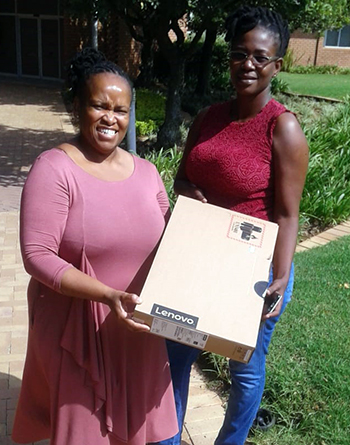News & Events
Major ICT boost for Unisa students as first laptops are issued
Friday, 29 March 2019 was a red-letter day for the University of South Africa (Unisa) and its students as it marked the start of a massive rollout of laptop computers to students funded by the National Student Financial Aid Scheme (NSFAS).

Smiles all round as a student receives her Unisa laptop from Ms Mavis Sibanda (left), Deputy Director in the Office of the Registrar
The rollout is the culmination of a process jointly spearheaded by Unisa’s Office of the Dean of Students and Office of the Registrar. The university’s concerted thrust to bring world-class education into the lives of students across Africa and, indeed, the world, is powered by the open distance and e-learning (ODeL) teaching and learning model. It goes without saying that one of the main cornerstones of ODeL is unhindered access to information and communications technologies, but the cost of such access and devices is a major obstacle to many students. ‘This,’ says Ms Mavis Sibanda, Deputy Director in the Office of the Registrar, who is managing the initiative, ‘is why Unisa embarked on a mission to ensure that many thousands of our deserving but financially constrained students are issued with laptops.’
Concerning Unisa’s broader technology drive, the institution’s Principal and Vice-Chancellor, Professor Mandla Makhanya, had this to say in a presentation at the UNESCO Mobile Learning Week in Paris, France, in March this year: ‘My disposition is always to embrace technology rather than resist it. Technologies are tools for human survival. Consequently, across time and space, human beings have consistently invented technology with the intention to enhance life chances and to get the most from the environment and even human labour. [Technology] presents great opportunities.’
Ms Sibanda explains that the laptop initiative commenced in earnest in October 2018 with negotiations and discussions between Unisa, NSFAS and suppliers, and consultations with student representatives. ‘I take my hat off to Dr Faroon Goolam, Unisa Registrar, and Dr Sibusiso Chalufu, Unisa Dean of Students, for the way they – with support from other interdependencies such as Unisa’s Supply Chain Management and Information and Communications Technologies units, the Department of Student Funding and the Legal Services Department – pulled out all stops to bring the initiative to fruition. Their inputs and leadership were invaluable during discussions and negotiations, and the support of the broader team within their respective offices ensured success. A testimony to the hard work put in by everyone concerned is that after the details were formalised last month, a mere two weeks elapsed before the first laptops were issued.’
To qualify students must be NSFAS beneficiaries and register for at least five modules at Unisa. Ms Sibanda says that distribution will continue until the end of April, and that it is envisaged that a whopping 8 256 units will be distributed in the first semester. Laptops of identical specification will be provided by Lenovo, HP and Acer, and issuing will take place in tranches. ‘It is important for students to note that they will be contacted by the relevant suppliers when their laptops are ready for collection, and that it is obviously not possible for all students to receive their units at the same time. To avoid disappointment they should therefore not travel to collection points until they have been contacted.’

In the first semester of 2019, 8 256 Unisa students funded by NSFAS will receive laptop computers from the university.
The laptops come fully loaded with Windows 10, the office365 suite, antivirus software and a browser. In the near future laptop recipients will be issued with a once-off allocation of 250 MB of data to enable them to connect to and register on the myUnisa student website which is the central platform providing access to study material and related information, and through which assignments are submitted. ‘Once they are registered users within the Unisa student IT ecosystem they will be able to access everything they need without data use on their part,’ says Sibanda.
In an exciting development linked to this initiative Unisa’s management has approved an additional amount of R5 million for the Unisa Library to purchase additional textbooks. The Unisa Library already boasts a very large collection of e-journals and e-books, including some of the textbooks prescribed across an array of courses and levels.
* By Philip van der Merwe (Editor, Department of Institutional Advancement)
Publish date: 2019/04/04
